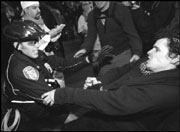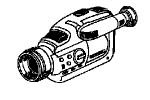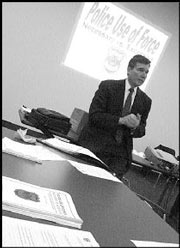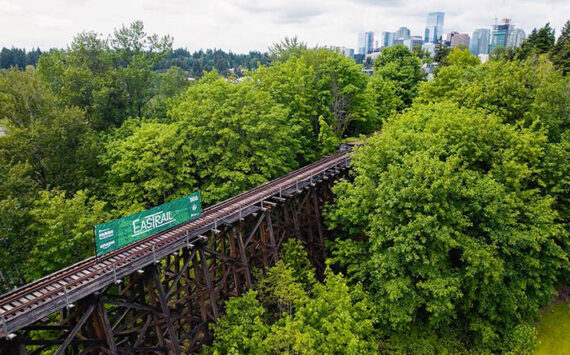IT COULD HAVE been a lot worse.
On a day of low expectations for activists and the police, the events of Saturday, April 20 (nicknamed A20) seemed to offer both groups some kind of hope.
Despite overwhelming public support for the Bush administration’s War on Terrorism, over 700 people went to Westlake Park to protest the United States’ growing war economy and its military support for Israel. Despite tense negotiations between protesters and police leading up to anti-capitalist events held later that day, violent confrontations were smaller in scale than either side had predicted.
Since the WTO, most radical political protests in Seattle have had their causes overshadowed almost entirely by the various war games played out on Seattle’s streets between activists and police.
Saturday’s events didn’t differ entirely from this script, but the relatively small scale of the confrontations did allow the media, the public, and perhaps the police to see protesters as people with social concerns, not just militants out to smash windows or battle cops.
The Seattle police seemed to acknowledge that demonstrations without permits aren’t their enemy when, at a press conference, Deputy Chief Clark Kimerer actually thanked protesters for their conduct on Saturday. It seemed like a 180-degree turn from a letter the police sent weeks before to Seattle Central Community College President Charles Mitchell, warning that protesters were bringing weapons and looking for trouble.
An e-mail from the Anti-Capitalist Collective, the radical activist group that had organized many of the afternoon’s events, called Saturday a “successful day of action.” But while protesters recognize that Saturday’s demonstrations went off better than some had anticipated, concerns about the police response still remain.
Legrand Jones, a National Lawyers Guild legal observer, accused police of frequently using excessive force, unnecessarily arresting people for minor infractions (all 19 arrests were for misdemeanors), and mishandling a street party at Broadway and Thomas on Capitol Hill that had not been granted a permit.
Just as the 30-minute party was about to disband and merge into a legally permitted march downtown, police moved in on bicycles to arrest a woman who had blocked traffic on Broadway by suspending herself from a 20-foot tripod.
Altercations with pepper spray ensued, and the crowd responded by throwing sticks and glass bottles, creating a tense situation that easily could have escalated but didn’t. “It wasn’t necessary to bulldoze in there,” says Jones. “I don’t think their response was warranted.”
A few protesters have called for a public hearing on the police response to A20, a request the mayor has so far denied. In all likelihood, concerns about police tactics will be voiced at the next meeting of the City Council’s Police Committee on May 1. Such meetings have been extremely contentious in the past.
But with protesters and police having cooperated enough to prevent extensive violence on Saturday, perhaps the stage has been set for a more respectful dialogue on both sides.
Trevor Griffey








